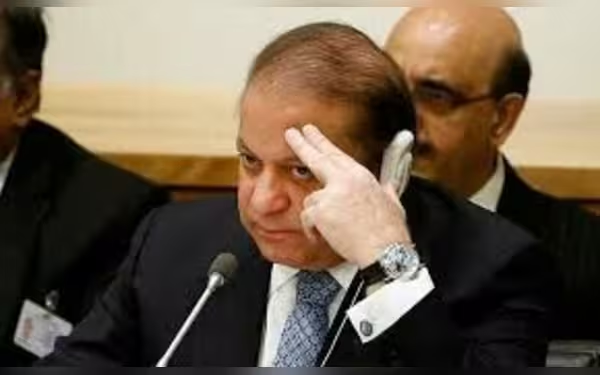Friday, November 8, 2024 01:32 PM
Nawaz Sharif's Inaction on Fazlur Rehman Hinders PML-N's Constitutional Agenda
- PML-N fails to secure support for Constitutional Package.
- Nawaz Sharif's absence raises questions about leadership.
- Discontent grows among PML-N leaders over strategy.
 Image Credits: dawn
Image Credits: dawnNawaz Sharif's absence during critical negotiations raises concerns over PML-N's leadership and strategy amid failed attempts to secure support.
In recent political developments in Pakistan, the PML-N-led coalition faced a significant setback when it failed to present a controversial 'Constitutional Package' in parliament. This failure was largely attributed to the inability to persuade Maulana Fazlur Rehman, a former ally of the PML-N. As a result, questions have arisen regarding the involvement of Nawaz Sharif, the PML-N President, who has been notably absent during this critical time for his party.
Despite the challenges, it was reported that Nawaz Sharif had been briefed on the proposed amendments and had given his approval. Pervaiz Rasheed, a close aide and former information minister, stated, "Mian sahib [did not have] any reservations over the proposed draft." This indicates that Nawaz was aware of the situation and had agreed with the direction the party was taking. However, the coalition's attempts to gain support from other parties, including the JUI-F, were met with rejection.
Efforts to engage Maulana Fazlur Rehman included multiple calls from a government delegation and two meetings with Prime Minister Shehbaz Sharif, all of which proved unsuccessful. After these failed attempts, Nawaz Sharif expressed a willingness to intervene personally, given his established rapport with the Maulana. However, insiders suggested that Nawaz was advised against this, as it was believed that the Maulana had already made up his mind.
During the weekend, both Nawaz Sharif and his nephew Hamza Shehbaz remained in Islamabad to participate in the voting for the constitutional package. However, they returned to Lahore after the coalition's efforts to secure a two-thirds majority in parliament fell short. Reports indicate that Nawaz expressed disappointment over his younger brother's inability to win over the JUI-F leader, highlighting a lack of foresight from both the PML-N and PPP regarding the Maulana's firm stance.
Within Punjab, murmurs of discontent have surfaced among some PML-N leaders, who believe that Nawaz Sharif should have taken a more proactive approach by convening a meeting with the party's top brass to address the situation. One party leader remarked, "The PML-N government has faced a huge embarrassment and [this episode is] a blow to its future plans related to the judicial amendments." This sentiment reflects a growing frustration within the party regarding the handling of the situation.
Despite the setbacks, Pervaiz Rasheed remains optimistic about reaching a consensus on the proposed amendments. He noted that while the PPP and JUI-F are working on their own drafts, there is a shared desire among all parties for judicial reforms. "The process of consultation with other parties is underway. One thing is clear, all parties want judicial reforms. They have a total consensus on this," he stated, although he could not provide a specific timeline for achieving this consensus.
The recent political turmoil surrounding the 'Constitutional Package' highlights the complexities of coalition politics in Pakistan. The failure to secure support from key allies like Maulana Fazlur Rehman raises important questions about leadership and strategy within the PML-N. As the political landscape continues to evolve, it remains to be seen how the party will navigate these challenges and whether they can ultimately achieve the necessary reforms that are crucial for the country's future.













